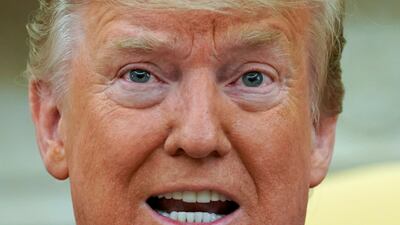US President Donald Trump warned Iran on Tuesday to "be very careful" over its breach of a uranium enrichment cap, reiterating a threat to Tehran as it takes more steps closer to a weapons-grade nuclear stockpile in violation of the landmark agreement.
"Iran is doing a lot of bad things ... and they'd better be very careful," the president told reporters at the White House.
Mr Trump's warning – repeating similar remarks he made over the weekend in New Jersey – came a day after UN inspectors confirmed Tehran had exceeded a uranium enrichment cap set by its landmark 2015 nuclear deal with world powers.
Iran appeared to ignore Mr Trump's warning on Tuesday night. Iranian Tasnim news agency reported a commander in Iran's elite Revolutionary Guards as saying US regional bases and its aircraft carriers in the Gulf are within the range of Iranian missiles.
"American bases are within the range of our missiles ... Our missiles will destroy their aircraft carriers if they make a mistake," said Hossein Nejat. "Americans are very well aware of the consequences of a military confrontation with Iran."
European powers took their first step on Tuesday towards punishing Iran for breaking its nuclear agreement, triggering the deal's mechanism to resolve breaches.
The foreign ministers of Britain, France and Germany, plus the foreign affairs chief of the European Union, said in a statement that Iran was "pursuing activities inconsistent with its commitments" under the deal, known as the JCPoA.
"These compliance issues must be addressed within the framework of the JCPoA, and a Joint Commission should be convened urgently," they said.
The three European powers are the remaining Western signatories to Iran's 2015 nuclear agreement, which was abandoned by the United States last year.
Convening a joint commission of signatories – the Europeans plus Russia and China – is the first step in a process foreseen in the agreement that could eventually lead to a "snapback," bringing back the international sanctions lifted by the deal.
"Iran has stated that it wants to remain within the JCPoA. It must act accordingly by reversing these activities and returning to full JCPoA compliance without delay," the European countries said.
French President Emmanuel Macron has taken an active mediation role, speaking to Iranian President Hassan Rouhani and Trump in recent days. Last year, he was weighing whether to become the first French leader to travel to Tehran since 1976. But tensions over the nuclear issue and Iran's involvement in the wars in Syria and Yemen meant he never accepted an invitation to visit.
Iran has said it wants to continue to abide by the agreement but cannot do so indefinitely if U.S. sanctions prevent it from receiving any of the promised economic benefits.
The deal's fate has come to a head in the past 10 days, after Iran announced steps that were in violation of its central commitments - it announced that it had amassed more enriched uranium than allowed under the agreement and said it had refined uranium to a higher purity.
Tehran argues that its steps are permitted under the deal as a response to U.S. non-compliance. It has said it could take new steps in 60 days, including restarting dismantled centrifuges and purifying uranium to a sharply higher threshold.
It has also railed against Britain after Royal Marines boarded a supertanker seized off the coast of Gibraltar last week for trying to take oil to Syria in violation of European Union sanctions. Gibraltar authorities did not disclose the origin of the oil, although Iranian officials have said it was their tanker.
Tests have shown that it was loaded with crude oil, the Gibraltan government said in a statement on Tuesday.
"Her Majesty's Government of Gibraltar can now confirm, after having received the results of comprehensive laboratory testing, that ... the Grace 1, which was detained in the early hours of Thursday morning, is loaded to capacity with crude oil," the government said in a statement.
"The results of these tests ... contradict the statements of some commentators from outside the jurisdiction who had speculated that the cargo on the vessel was not crude."
The statement said the Grace 1 was detained when it freely navigated into British Gibraltar’s territorial waters, having previously left the international waters of the Straits of Gibraltar on a pre-arranged call for provisions and spare parts.
Spain, which challenges British ownership of Gibraltar, had said last week the action was prompted by a U.S. request to Britain and appeared to have taken place in Spanish waters.
Gibraltar's statement said the vessels detention related to the suspected destination of the cargo, Syria’s Banyas refinery, which is owned by the Banyas Oil Refinery Company and subject to EU sanctions.

